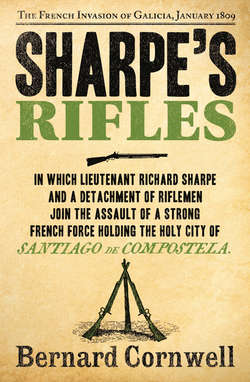Читать книгу Sharpe’s Rifles: The French Invasion of Galicia, January 1809 - Bernard Cornwell - Страница 13
CHAPTER FIVE
ОглавлениеThe villagers could have sent no warning of the French presence for there was no village any more, nor villagers.
The fires must have been set just as the ambush was sprung, for the houses still burned fiercely. The corpses, though, had frozen hard. The French had killed the people, then sheltered in their houses as they waited for Vivar’s small column to reach the high canyon.
It had never been much of a village; a poor place of goats and sheep, and of people who made a living from high pastures. The houses lay in a hollow sheltered by dwarf oaks and chestnut trees. Potatoes had grown in a few small fields that were edged with wild mulberries and furze. The houses had been mere thatched huts with dungheaps at their doors. They had been shared by men and animals alike, just as the houses Sharpe’s own Riflemen had known in England had been, and that nostalgic resemblance added to the poignancy of the day.
If anything could add to the poignancy of children and babies killed, of women raped, or of men crucified. Sergeant Williams, who had known his share of horror in a bad world, vomited. One of the Spanish infantrymen turned in silence on a French captive and, before Vivar could utter a word, disembowelled the man. Only then did the Cazador utter a howl of hatred.
Vivar ignored the killing and the howl. Instead, with an odd formality, he marched to Sharpe. ‘Would you …’ he began, but found it hard to continue. The stench of those bodies which burned inside the houses was thick. He swallowed. ‘Would you place picquets, Lieutenant?’
‘Yes, sir.’
That, at least, took the Riflemen away from the bodies of slaughtered infants and the burning hovels. All that was left of the village’s buildings were the church walls; walls of stone which could not be burned, though the church’s timber roof still flamed high to spew smoke above the valley’s rim where, among the trees, Sharpe placed his sentries. The French, if they still lingered, were invisible.
‘Why did they do it, sir?’ Dodd, a quiet man, appealed to Sharpe.
Sharpe could offer no answer.
Gataker, as fly a rogue as any in the army, stared empty-eyed at the landscape. Isaiah Tongue, whose education had been wasted by gin, winced as a terrible scream sounded from the village; then, realizing that the scream must have come from a captured Frenchman, spat to show that it had not troubled him.
